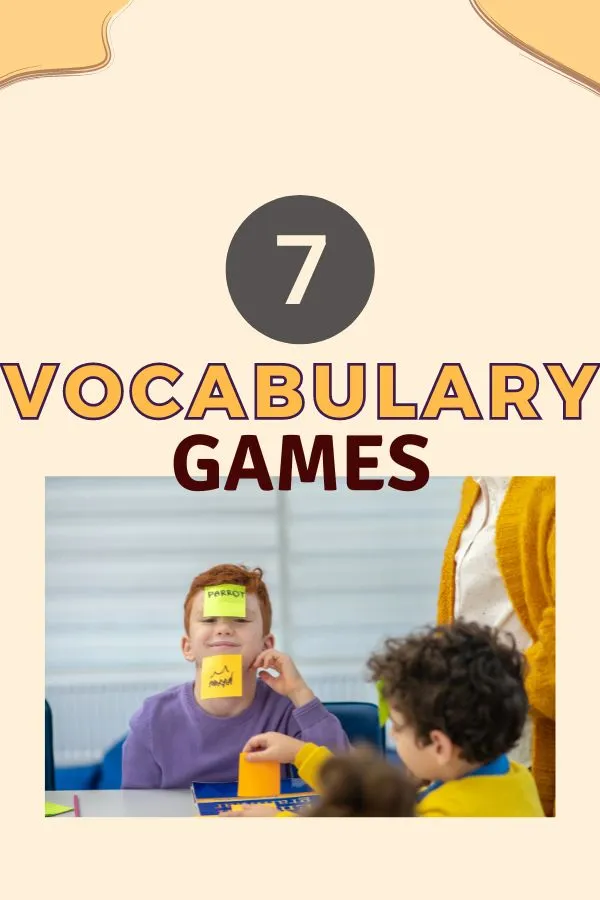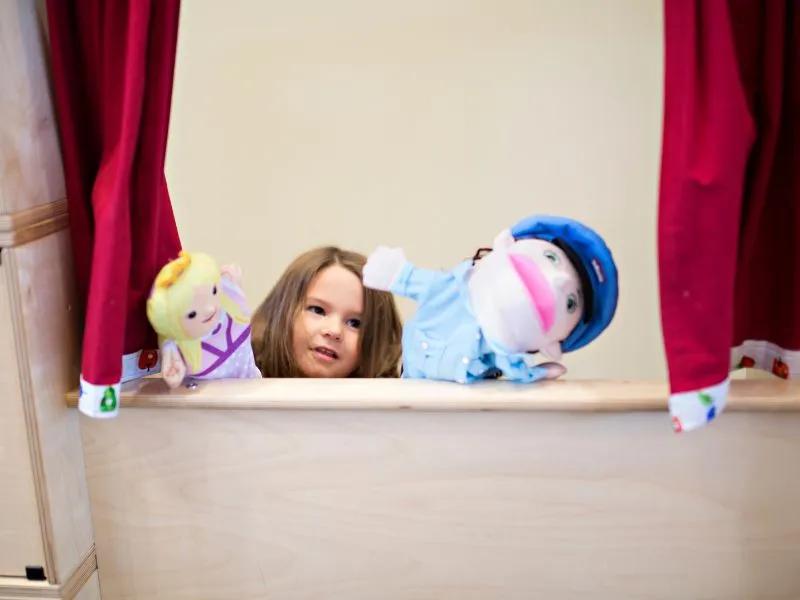7 Vocabulary Games For Kids
Vocabulary games are a fun way for children to improve their language skills. Interactive vocabulary games encourage active involvement and help kids remember new words. In this blog post, we’ll talk about a variety of engaging vocabulary games for kids in their early years.

Related Articles:
Vocabulary Development Milestones By Age Group
Let’s look at vocabulary development milestones for each age group, starting at toddler age.
At AROUND 2 years
- Says at least two words together, like “More milk.”
- Points to at least two body parts when you ask him to show you
AT AROUND 2 1/2 YEARS
- Say about 50 words
- Say two or more words together
- Say words like “I”, “Me”, “We”
At around 3 years
- Talks with you in conversation using at least two back-and-forth exchanges
- Asks “who,” “what,” “where,” or “why” questions, like “Where is mommy/daddy?”
- Says first name, when asked
- Talks well enough for others to understand, most of the time
At around 4 years
- Says sentences with four or more words
- Says some words from a song, story, or nursery rhyme
- Talks about at least one thing that happened during his day, like “I played soccer.”
At around 5 years
- Tells a story she heard or made up with at least two events.
- Answers simple questions about a book or story after you read or tell it to him
- Keeps a conversation going with more than three back-and-forth exchanges
Vocabulary Games For Kids

ROLE PLAY GAMES
Playing an imaginary game is a fantastic and creative way to improve vocabulary for kids while making learning enjoyable.
You can expand this game to different settings and teach vocabulary used in each scenario effectively.
How to play:
- Set the scenario by explaining what role each one plays.
- If they are old enough, ask your child to come up with their own character.
- Imagine it’s a real-world setting, and continue the conversation. Be sure to add new words as you go along.
- Encourage the kids to engage in interactive conversations.
Different settings you can try:
- In a hospital- Interaction between doctor/nurse and patient
- In dentistry – interaction between dentist and patient
- In a restaurant – Conversation between the shop owner and customers
- In a plane – Conversation between the air hostess and passenger
- In the airport – Conversation between security officer and passenger
- In a school – Conversation between the teacher and students
VOABULARY CHARADES
The vocabulary version of charades is a wonderful way to learn new words for kids. You just need a bit of creativity to play this game.
How to play:
- Think of a word or scenario, and instead of acting it out, use other phrases to describe it. Give clues. Usually, it’s better to play this role by yourself.
- Children have to guess the word based on your description.
- Ice cream—it’s a desert. Something sweet and cold. Comes in different flavours.
- Zoo – somewhere we went recently. You can see lots of animals here.
I SPY WITH MY LITTLE EYES
Playing “I Spy” with kids is a classic and engaging game. This can be played at any time and anywhere – be it in your living room or outdoors. A minimum of two people are required to play this game.
This helps children explain commonly seen objects.
How to play:
- First, choose one person to be the “spy”. This person silently selects an object in the room but keeps it a secret.
- To kick things off, the spy says, “I spy with my little eye, something that is…” and gives a clue about the chosen object.
- For instance, if the chosen object is a red ball, the spy might say, “I spy with my little eye, something that is red.”
- The others then guess what the object is based on the clue.
Different ways of playing I spy:
- Colour (Something that is red, blue, pink,…)
- Shape (Something that is round, square,…)
- Taste (Something bitter, sweet,…)
- Touch (Something bumpy, smooth,…)
- Starting with letter (Something starting with ‘A’)
- Measurement (Something tall, heavy,…)
- Objective (Something used for cooking, painting,…)
- Combination of all the above (A book that starts with ‘B’, Something red and round shape,…)
STORY BUILDING
Begin a simple story by setting the scene or introducing a character and let it go wild.
This is a super fun way to let kids express themselves freely and improve their vocabulary. Again, this is something you can do anywhere, just with some imagination.
How to play:
- You can start the story with any general idea. For example, “Once upon a time, in a magical forest, there was a little bunny named Benny.”
- Let the kids continue the story.
- If you feel you need to bring the story to a different area for them to use more words, then divert it accordingly.
SIMON SAYS
“Simon Says” is an entertaining game and a good listening activity as well. You can take this to the next level by introducing various commands and adding new words.
How to play:
- One person gives commands preceded by the phrase “Simon says.” The trick is that others should only follow the command if it begins with “Simon says.”
- If Simon gives a command without saying “Simon says” and someone follows it, they are out of the game.
- For example, if Simon says, “Simon says touch your toes,” everyone should touch their toes. However, if Simon simply says, “Jump,” participants must not follow the command
Different commands you can try:
- Clap your hands
- Sping around
- Hop on one foot
- Wiggle your fingers
- Nod your head
- Pretend to be a robot
- Make a funny face
- Pretend to be an animal
- Raise your hand
- Touch your body parts
- Touch other objects
- Count (ex: count to five)
More Vocabulary Games For Kids: Setup Required
TIN CAN TELEPHONE GAME
Playing a game with the oldest telephone is always fun. This is something easy to set up and can be played outdoors as well.
How to play:
You will need two plastic cups and a cord or string about 6 feet long.
- Start by making a small hole at the bottom of each plastic cup.
- Thread one end of the string through the hole of one cup and tie a knot to secure it. Repeat the process for the other cup, making sure the string is pulled tight between them.
- Let the kids know that they are going to play the telephone game using the cups and string. Only one person can talk at a time.
- Choose one person to start the game. They should whisper a short message into the cup. Make sure that the others cannot hear.
- You can talk about various topics and the conversation can go on.
Different conversations you can have:
- Emergency call
- Calling to book an appointment
- Calling the doctor
- Ordering food
Puppet Play
Another imaginative play, that requires a bit of set-up. Consider this as your own mini puppet show.
How to play:
- You will need puppet characters. They can be store-bought or you can make them with socks, felt and other craft materials.
- Ask your child to pick a short story / scenario and use dialogue to act it out.
Different scenarios to act out:
- Superhero quest
- Space exploration
- Dinosaur discovery
- Cooking show
- Sports champion
Benefits Of Vocabulary Games For Kids
Let’s look at some of the benefits of playing vocabulary games for kids.
Vocabulary development AND COMMUNICATION SKILLS
Obviously, this is the primary objective of these games.
Children unknowingly absorb new words, their meanings, and how to use them in context. The interactive nature of these games allows children to actively engage with words, making the learning process more effective and enjoyable.
It also helps with improving their language comprehension, fluency, and communication skills.
INCREASED CONFIDENCE
Playing vocabulary games can help children gain confidence in their language skills by effectively learning and using new words.
Cognitive Development
Vocabulary games enhance attention span, problem-solving, and critical thinking.
Children are challenged to recall and apply the words they have learned, strengthening their memory and retention abilities.
They are also presented with various word-based puzzles and challenges, which require them to think critically.
ACADEMIC SUCCESS
A strong vocabulary is essential for success in various subjects, including reading, writing, and comprehension.
By regularly engaging in vocabulary games, children develop a solid foundation of words.
Creativity SKILLS
Many vocabulary games encourage imaginative thinking and creative expression, as children come up with stories, sentences, or scenarios using the words they’ve learned.
Adding Vocabulary Games To The Daily Routine
Integrating vocabulary games into daily routines is fairly simple as these do not require additional materials most of the time.
MAKE TIME DURING DAILY CHORES
It is highly effective to add vocabulary activities like stories or imaginary games during or after daily chores.
For example, during bath times, you can introduce word-related activities. Also, adding storytelling sessions before bedtime allows for the introduction of new words in an imaginative context.
USE THE ADVANTAGE OF DAILY RIDES AND WALKS
During car rides or walks, engaging in these games can be really effective. For example, “I spy” is one of my favourites during card rides.
Wrapping Up
Vocabulary games are not just about learning words; they’re about improving communication skills, boosting confidence and turning language development into a fun-filled activity.
Happy playing and word weaving!
Let us know your favourite activity.




Leave a Reply